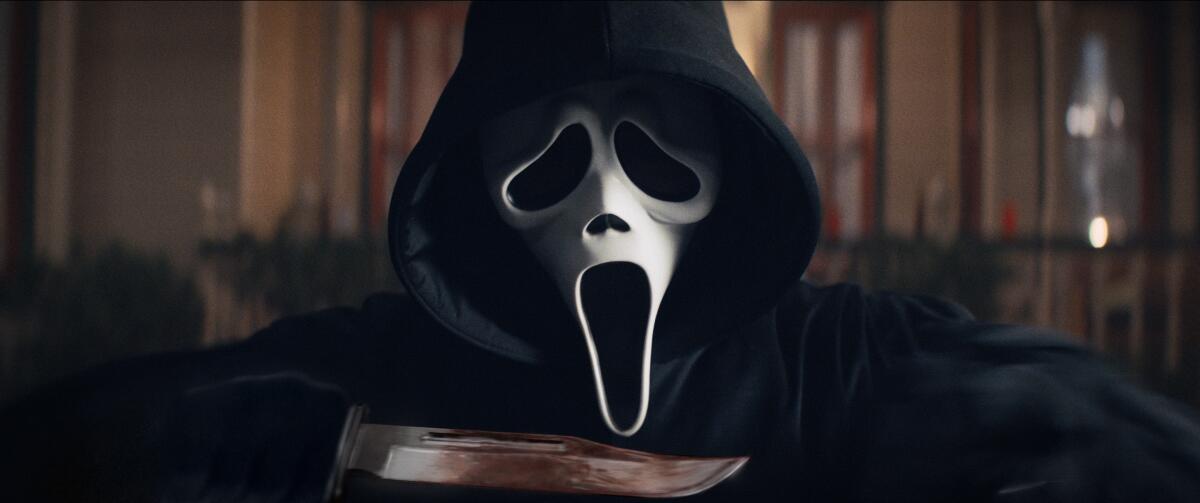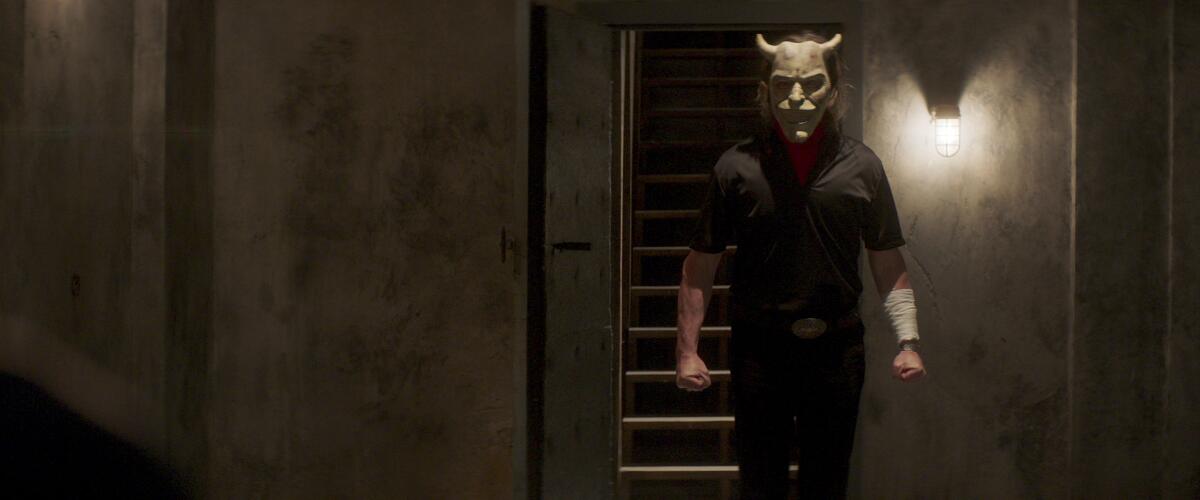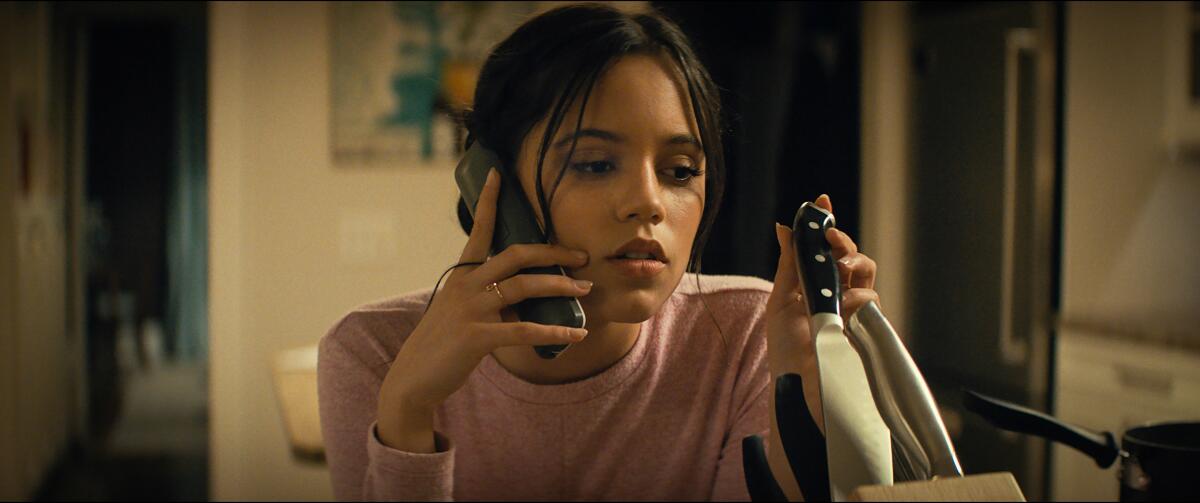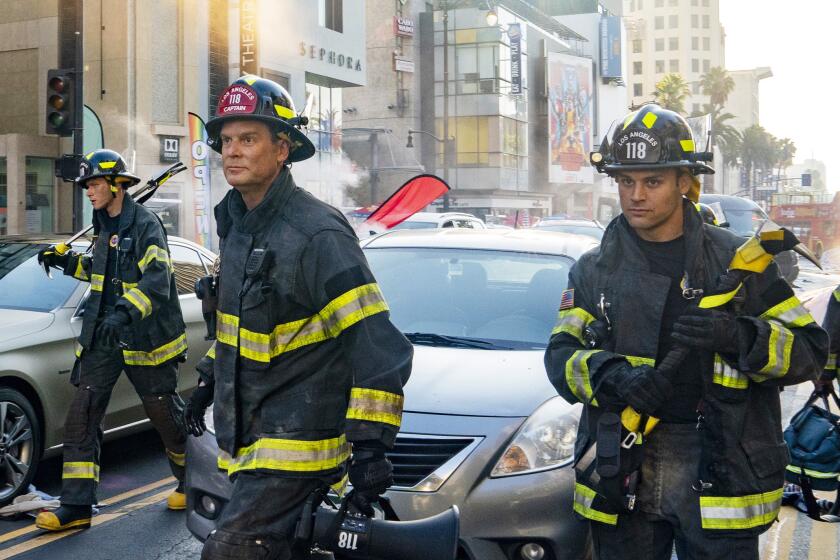Despite Omicron surge, âScreamâ will only screen in theaters. Film critics weigh the risk

After a 2021 Hollywood reopening that saw audiences return to theaters, the pandemicâs post-holiday surge has thrown a new wrench into the movie business. Record COVID-19 rates have some journalists who cover Hollywood, especially those who are high risk or have friends or family who are, rethinking the riskiness of going to the movies.
Journalist and author Richard Newby, a freelance contributor to the Hollywood Reporter and Fangoria, was excited to catch âSpider-Man: No Way Homeâ in theaters â twice â as recently as December.
But Newby lives in Ohio, where post-holiday hospitalization rates are crossing record numbers. At home he has young children who are not yet eligible for the vaccine. The personal risk assessments for many, as with dining out or doing just about anything in public, feel different thanks to Omicron.
âI would love to feel comfortable going to the movie theater,â Newby told The Times. âBut itâs frustrating to have to think, âCan I see this movie that I need to see for coverage and to get paid, or am I putting my family at risk by going?ââ
Experts say vaccines and boosters effectively reduce severe illness, but the now-dominant variant is also highly contagious, with testing labs reportedly backed up and rapid tests hard to find. Some project Omicron will peak this month, and the entertainment industry has responded by canceling, postponing or adapting events including awards galas, movie releases and festivals such as the Sundance Film Festival, which pivoted to make its 2022 edition virtual this month for the second year in a row.
And as the variant exploded, what was already a relatively sparse early 2022 theatrical release schedule has whittled away to just a few major studio titles.
Disney shuffled the Ben Affleck thriller âDeep Waterâ from 20th Century Studios to a streaming debut on Hulu, while Sony â still riding high on the âSpider-Manâ success â moved its Marvel antihero movie âMorbiusâ from Jan. 28 to April 1. Even Universal, which released the widely panned action movie âThe 355â this weekend to dismal numbers, shifted Feb. 4 horror title âThe Black Phoneâ to June.

The only remaining studio wide release opening only in theaters this month is Paramountâs Jan. 14 slasher âScream,â the fifth entry in the hit horror franchise. The film stars returning favorites Neve Campbell, Courteney Cox and David Arquette and boasts the franchiseâs most inclusive ensemble to date with new stars including Melissa Barrera, Mason Gooding and Jenna Ortega.
Despite axing a red carpet premiere this week, the studio has not made alternatives to in-person screenings available to journalists, preferring they view the film on the big screen with limited capacities, masking and health questionnaires. Paramount declined to comment on the matter.
Press, radio and junket screenings are set to proceed as planned following local COVID-19 guidance. However, in states such as Texas, submitting a vaccine questionnaire in order to attend is voluntary. According to a studio source, individual screenings of âScreamâ will be set for journalists by request, although how many private screenings have been requested across the country is unclear.
Paramount has been among the most cautious studios when it comes to releasing films in the pandemic, pushing the openings of marquee titles and selling others to streamers including Amazon, Netflix and Hulu. The family titles âPAW Patrol: The Movieâ and âClifford the Big Red Dogâ both premiered on Paramount+ simultaneous with their theatrical release last year. The studio scored a hit with âA Quiet Place Part II,â which opened over Memorial Day weekend, as vaccines were seemingly starting to stem the spread of COVID.
Omicron is being felt by the film and TV industry, as Hollywood productions delay the restart to work in the new year.
That film went to Paramount+ 45 days after an exclusive theatrical run, a strategy that âScreamâ and the studioâs upcoming âJackass Foreverâ (Feb. 4), âThe Lost Cityâ (March 25) and âTop Gun: Maverickâ â which has repeatedly moved dates and is now slated for May 27 â may follow. Itâs unclear how other major distributors will respond to the quicklyevolving COVID situation, but on Friday Disney announced it will once again send one of its animated features, Pixarâs âTurning Red,â directly to Disney+ this March.
And while many specialty distributors and streaming outlets will offer journalists options to view their releases at home, the strategy among larger studios remains more difficult to parse. Warner Bros. â which released its entire 2021 theatrical slate simultaneously in theaters and on HBO Max â frequently denied requests for screener access during the second half of 2021, often citing filmmaker preferences for theatrical screenings. (This year, the studio plans 45-day theatrical windows for its event releases ahead of HBO Max streaming.)
Links or physical screeners are preferred alternatives for those increasingly uneasy about attending screenings during a surge, even masked and at reduced capacity. Screener access also broadens potential coverage by making it possible for a more diverse array of journalists, including those outside of major metropolitan areas and those who are disabled or at risk, to see and cover a film.
âAccess to screeners is vital to all film journalists and especially film critics, more than ever now, during this COVID surge,â said NPRâs Film Week critic and LA Film Critics Assn. President Claudia Puig. âGiven that the Omicron variant is especially contagious, in-person screenings are risky for most people, and particularly fraught for journalists with health issues. As the majority of those who work at studios are working safely from their homes, they should be sympathetic to their journalist colleagues who request screener links.â

Without distributors offering alternatives to in-person advance screenings, which are sometimes also open to the public, offer concessions and donât strictly enforce masking when not eating or drinking, critics and journalists may opt not to see a film at all. Those decisions can impact how new films are seen and covered.
Several critics contacted for this piece expressed low to moderate concerns about attending screenings during the current surge. Others say that the theaters-only advance screening policy for âScreamâ forced them to change plans to talk or write about the film.
Seattle-based podcaster Dave Chen, co-host of the popular Filmcast podcast, decided that watching âScreamâ in person was not worth the possible exposure to himself and in turn to immunocompromised members of his close social bubble. Speaking to The Times, he emphasized that the choice was specific to his own personal decision around his level of risk.
âI think seeing a movie in advance, or being able to be compensated in any way to see and talk about movies, is an enormous privilege, so I donât have any complaints over any studios that choose to distribute their movies however they wish,â said Chen.
But, acknowledging the dilemmas that any studio might face in the pandemic given marketing expenditures and exhibitor expectations, Chen is also conscious that in covering a theatrical release, he may be encouraging listeners to place themselves at risk to see it.
âI canât speak with authority that it is definitely dangerous to go to see a movie, and I donât want to fearmonger that way either,â said Chen. âBut I approach it as, Iâm an agnostic. And therefore, given that Iâm not sure, Iâd rather just not take the risk.â
The Producers Guild Awards have been postponed because of Omicron, joining the Grammys and myriad events that have been axed or delayed.
For the immediate future, Chen and his podcast co-hosts will focus on movies that are more readily accessible, including award season titles now available on demand and streaming such as A24 and Apple TV+âs âThe Tragedy of Macbethâ and Netflixâs âDonât Look Up.â
As entertainment journalists including Kristen Lopez, television editor at IndieWire, have pointed out, the issue of screening accessibility isnât only relevant in times of peaking waves of a deadly crisis.
Lopez covered the ongoing call for screener equity in August as the Delta variant sent COVID rates soaring to numbers now eclipsed by Omicron. Her reporting, along with efforts by critic Scott Renshaw, president of the Utah Film Critics Assn., led to statements from L.A. and Boston critics groups urging studios to not only maintain safer COVID protocols at in-person screenings but also to extend screener access to disabled and at-risk journalists beyond the pandemic.
âAs a disabled critic, thereâs always been an issue with seeing a movie in a theater or in a screening room,â said Lopez, who is based in L.A. âThere are studios that still do not have ADA capabilities in some regards. So the desire to have a screener was always something that I had been asking for. If you want more disabled critics in this job, screener access has to be something thatâs possible.â

There are further measures that studios could take to contribute to greater inclusivity in criticism, she added. âWeâre still living in a world where closed captioning on a screener is a rarity in many regards, so youâre excluding deaf critics right off the bat,â said Lopez. âThereâs a lot of need for screener equity because it benefits and welcomes a lot more minority groups than I think we think exist, or should be, in this industry.â
Last year was the first time Lopez, who has covered a variety of film and television in her 15-year career and uses a wheelchair, attended the Sundance Film Festival because it was held online with virtual screenings. In recent months she started venturing back into smaller, more controlled private screenings where requirements around masking and vaccination were more consistent. But the Omicron surge forced her to reassess.
âNow that the numbers are where they are I donât plan on going to see a movie in a physical space until this is not over, but settled,â she said. âThere are movies Iâd love to experience and Iâd love to give my viewpoints on, but unless theyâre going to be sent to me itâs just not worth the risk.â
As for âScream,â Newby has come to a tentative conclusion. A journalist who regularly covers horror and genre fare, heâs an otherwise frequent moviegoer who already bought tickets for a less busy Thursday night showing. At present, he plans to double mask and sit in the last row.
Now that most other high-profile releases have moved out of Omicronâs path, Newby is mulling a temporary shift to covering TV and streaming titles he can view at home.
âEspecially with the way things are heading this winter,â he said, âIâm probably going to be making a lot less trips to the theater, unfortunately.â
More to Read
Only good movies
Get the Indie Focus newsletter, Mark Olsen's weekly guide to the world of cinema.
You may occasionally receive promotional content from the Los Angeles Times.













